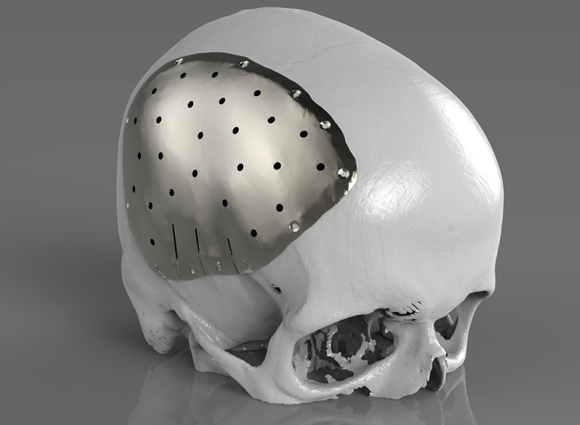Renishaw demonstrates bespoke additively manufactured implants at 3D Printing in Medicine Conference
May 22, 2017

A metal additively manufactured cranial implant produced by Renishaw (Courtesy Renishaw)
Renishaw recently attended the second annual International 3D Printing in Medicine Conference in Mainz, Germany, May 19-20. The Gloucester, UK-based company took advantage of the conference to highlight some of the opportunities that Additive Manufacturing is creating in the field of craniomaxillofacial surgery, exhibiting its bespoke implants and providing demonstrations of its new implant design software, Additive-manufacture for Design-led Efficient Patient Treatment (ADEPT).
During the conference, the company demonstrated its knowledge of patient-specific implants for craniomaxillofacial applications and explained the benefits that a digital workflow can bring to the field. On the Renishaw stand, visitors were introduced to successful examples of instances in which the company’s implant technology was used to improve patient outcomes, including a recent case wherein Neurosurgeon Bartolomé Oliver performed a craniotomy using parts manufactured on a Renishaw AM250 metal Additive Manufacturing machine. The company also cases in collaboration with surgeons Shakir Mustafa and Adrian Sugar.
Renishaw also offered demonstrations of its new software package, ADEPT, aimed at enabling the widespread use of Additive Manufacturing to produce bespoke maxillofacial implants by mitigating cost and efficiency barriers. According to Renishaw, the collaborative project also draws on the academic and industrial expertise of several UK partners; LPW Technology Ltd, the Abertawe Bro Morgannwg University Health Board and PDR, located within Cardiff Metropolitan University.
“3D printing is a rapidly growing technology in many areas of medicine, as it has the potential to improve efficiency, accuracy and ease of customisation,” explained Ed Littlewood, Marketing Manager for Renishaw’s Medical and Dental Products Division. “Since we presented at the first annual conference last year, we have seen a growing interest and awareness of bespoke AM implants.”
“AM patient-specific implant technology offers benefits to the surgeon, hospital and most importantly the patient,” explained Amy Davey, Reconstructive Scientist at Southmead Hospital and Renishaw’s Medical and Dental Products Division. “The implants can have a positive impact on hospitals, by improving patient outcomes and speeding up surgery. Demonstrating successful cases of additively manufactured patient-specific implants will help open the industry’s eyes to the potential of AM technology, increasing uptake and improving clinical outcomes.”
















